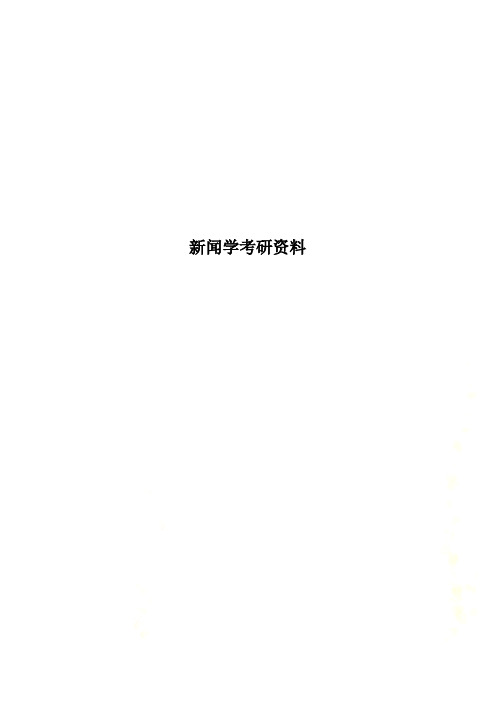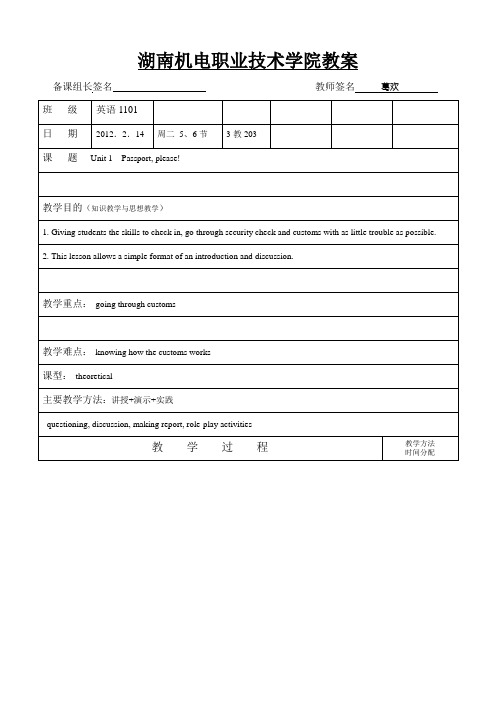湖南大学机自英语教程 (9)
- 格式:ppt
- 大小:132.00 KB
- 文档页数:11


湖南的大学英语教材书目大学英语教材对于培养大学生的英语语言能力和跨文化交际能力起着重要的作用。
湖南的大学英语教材书目也在不断提升和发展,以满足学生的学习需求。
以下是湖南大学的英语教材书目推荐:一、大学英语教材1. 《大学英语》(第四版)- 王梦芸、姜丽萍编著这是湖南省高校大学英语教材的主要版本之一。
该教材分为四册,以培养学生的听、说、读、写和翻译能力为主要目标。
教材内容涵盖了语法、阅读、写作、听力、翻译等方面,同时注重培养学生的综合运用能力。
2. 《全新版大学英语》(综合教程)- 韩礼元、王玲编著该套教材为湖南省高校大学英语综合教程的重要版本之一。
教材引入了任务型教学法,通过生动的对话、主题文章和多媒体资源进行教学,使学生能够在实际语境中运用英语进行交际和表达。
教材内容设计灵活,同时包含了听说读写翻译等多个层面。
二、阅读教材1. 《大学英语阅读》(第二版)- 王梦芸主编该教材旨在提高学生的阅读速度和阅读理解能力,涵盖了各种不同主题和体裁的短文。
教材通过选取有代表性的文章,帮助学生了解不同的文化背景和观点,提高他们的跨文化交际能力。
2. 《大学英语阅读与翻译》- 陆向华主编该教材旨在培养学生的阅读理解和翻译能力。
教材内容包括了不同主题和体裁的文章,如社会热点、科技进展和文化交流等。
通过练习和任务的设计,学生能够提高在阅读和翻译方面的能力。
三、语法教材1. 《英语语法与写作》(第三版)- 施宏明主编该教材主要用于提高学生的语法意识和写作能力。
教材内容结构清晰,包括了基础语法知识、句型转换、作文写作等部分。
通过系统性的学习,学生能够在英语表达和写作上得到提升。
2. 《英语语法精讲精练》(第二版)- 张天红主编该教材主要面向学生的语法系统训练和巩固。
教材内容包括了语法知识的讲解、练习和测试题等。
学生可以通过自主学习和练习,快速提高对英语语法的掌握程度。
总结湖南的大学英语教材书目包括了大学英语教材、阅读教材和语法教材等多个方面。


新闻学考研资料新闻学作为一个涵盖范围很广泛的专业,现在越来越吸引广大考研学子的眼球。
很多考研学子打来电话,希望咨询专家在新闻学方面给出一些院校的意见。
近来,我们搜集各方面信息,结合历年积累的经验,总结新闻学专业研究生院校的相关信息供广大考生参考。
排名招生单位等级1 中国人民大学A+2 中国传媒大学A+3 复旦大学A+4 武汉大学 A5 华中科技大学 A6 四川大学 A7 南京大学 A8 北京师范大学 A9 清华大学 A10 暨南大学 A11 南京师范大学 A12 湖南大学 AB+等级新闻学研究生院校郑州大学厦门大学山西大学西北大学北京大学广西大学河北大学南昌大学浙江大学新疆大学吉林大学内蒙古大学辽宁大学上海外国语大学西南政法大学华中师范大学山东大学中央民族大学河南大学B等级新闻学研究生院校湖南师范大学苏州大学中国青年政治学院湘潭大学湖北大学华东师范大学汕头大学黑龙江大学渤海大学中南财经政法大学东北师范大学安徽大学上海财经大学广州大学中国政法大学云南大学重庆大学河北经贸大学新闻学包括新闻学方向和广播新闻与电视新闻学方向:新闻学方向的核心课程有:1.《新闻学概论》 2.《中国新闻事业史》3.《外国新闻事业史》 4.《新闻采访写作》 5.《新闻评论写作》 6.《中外新闻作品研究》 7.《广播新闻与电视新闻》8.《新闻心理学》9.《传播学概论》10.《文学概论(一)》11.《新闻摄影》12《公共关系学》13.《报纸编辑》14.《新闻事业管理》15《中国现代文学作品选》16《新闻心理学》17.《广告学(二)》。
广播新闻与电视新闻方向的核心课程有:1.《新闻学概论》 2.《中国新闻事业史》3.《外国新闻事业史》 4.《新闻采访写作》 5.《广播电视技术基础》6.《节目策划与编导》 7.《广播新闻与电视新闻》8.《新闻心理学》9.《传播学概论》10.《文学概论(一)》11.《新闻摄影》12《主持人节目》13.《电视摄象》14.《新闻事业管理》15《电视节目制作》16《新闻心理学》17.《广告学(二)》18.《播音文体理论》。

Unit 9How I FoundMy VoiceJamesEarl Jones1 TodayI am knownfor my voiceas much as for my acting. It has been my goodfortun e to receiv e jobs such as the speaki ng role of DarthVaderin George Lucas’s Star Wars trilog y and the voice-over announ cer for CNN cabletelevi sion.I also narrat ed AaronCoplan d’s Lincol n Portra it on a compac t disc I record ed with the Seattl e Sympho ny. Perhap s my greate st honorcame when I was askedto read the New Testam ent on tape.2 But it took a long time to believ e such good things couldhappen to me. When Iwas a youngs ter I stutte red so badlyI was comple telyunable to speakin public.3 SinceI was eightI’d had troubl e speaki ng. It was so bad that whenev er I stoodup in classto read, the otherkids snicke red and laughe d. I always sat down, my face burnin g with shame.4 I’m not sure what caused my stutte ring. Perhap s it was an emotio nal proble m. Iwas born in Arkabu tla, Missis sippi, and when I was aboutfive, I movedto live with my grandp arent s on theirfarm near Dublin in northe rn Michig an. It was trauma tic moving from the warm, easy ways of catfis h countr y to the harshclimat e of the north, wherepeople seemed so differ ent.5 Fortun ately, my grandd addywas a gentle man, a farmer who taught me to lovethe land. He was shortand he had a prodig iousamount of energy. He even builta church to please grandm other, a ferven t worshi per of the Lord. All sortsof people were invite d to our little church; white, blackand Americ an Indian came togeth er ina nonden omina tiona l fellow ship. Grandd ad’s Irishherita ge came out in his love forlangua ge; during the week he used “everyd ay talk”, but on Sunday he spokeonly the finest Englis h.6 As much as I admire d his fluenc y, I couldn’t come closeto it. I finall y quitSunday school and church, not wantin g to be humili atedany more. All throug h my gradeschool years, the only way the teache r couldassess my progre ss was for me to writedown everyt hingI had learne d.7 Oh, I couldtalk, all right. Our farm animal s knew that. I foundit easy to call thepigs, tell the dogs to roundup the cows, and vent my feelin gs to Fanny, the horsewhosebig browneyes and lifted ears seemed to expres s intere st in all I said. But when visito rs came and I was askedto say hello, I couldonly stand, poundmy feet,and grit my teeth. That awfulfeelin g of my voicebeingtrappe d got worseas I grew older.8 Then when I was 14, Profes sor Donald Crouch came to our school. He was aretire d colleg e profes sor who had settle d in nearby Brethr en, a Mennon ite commun ity. When he heardthat our agricu ltura l high was teachi ng Chauce r, Shakes peare and otherclassi cs, he couldn’t standnot beinga part of our school. So he left his retrea t to teachus Englis h, histor y and Latin.9 Donald Crouch was a tall, lean man with gray hair; Englis h was his favori tesubjec t, poetry was his deepes t love. He’s been an associ ate of Robert Frost. He helda book of poemsas if it were a diamon d neckla ce, turnin g pagesas if uncove ringtreasu res. He memori zed a poem everyday, explai ningthat if he ever lost his eyesig ht he wouldstillbe able to savorall that beauty.10 When he learne d that I not only lovedpoetry but was writin g it, we foundakinshi p. Therewas, howeve r, one diffic ultybetwee n us. Profes sor Crouch (we always called him that) couldnot standthe fact I refuse d to read my poemsto the class.11 “Jim, poetry is meantto be read aloud,just like sermon s,” he presse d. “Youshould be able to speakthosebeauti ful words.”12 I shookmy head and turned away.13 Then he tricke d me. I labore d long and hard on a poem, and afterhandin g it in Iwaited expect antly for his critiq ue. It didn’t come. Instea d, one day as the studen ts assemb led, he challe ngedme. “Jim, I don’t thinkyou wrotethis.”14 I stared at him in disbel ief. “Why,” I starte d, angerfloodi ng me, “of course Idid!”15 “Well, then,” he said, “you’ve got to proveit by gettin g up and reciti ng it frommemory.”16 By then the otherstuden ts had settle d at theirdesks.He looked at memeanin gfull y and nodded. With kneesshakin g, I walked up before my peers.17 “Jim will recite his latest poem,” announ ced Profes sor Crouch.18 For a moment I stoodbreath less. I couldsee smirks and wry smiles on somefaces. Then I began. And kept going. I recite d my poem all the way throug h withou t hesita tionor fault! I stoodamazed and floate d back to my desk in a daze, amid wild applau se.19 Afterw ard, Profes sor Crouch congra tulat ed me. “Aha,” he said. “Now we havesometh ing here. Not only will you have to writemore poetry and read it aloudto know how good it feels, but I’m sure that you will want to read otherwriter s’ poetrybefore the class.”20 I was dubiou s aboutthat, but said I’d try.21 Soon I beganto discov er someth ing otherstutte rersknow. Most have noproble m singin g becaus e the lyrics’ rhythm ic patter n flowsby itself. I foundthe same cadenc es in poetry, and before long my fellow studen ts actual ly looked forwar d to hearin g me recite. I lovedthe rollin g beat of The Song of Hiawat ha, especi allysinceI had Indian bloodin my veins.22 I discov eredI did have a voice, a strong one. UnderProfes sor Crouch’s tutela ge,I entere d orator icalcontes ts and debate s. He neverpushed anythi ng at me again; hejust wanted all his studen ts to wake up.23 As my stutte ringdisapp eared, I begandreami ng of becomi ng an actor, like myfather, who was then perfor mingin New York City. No one in my family had ever gone to colleg e. But encour agedby Profes sor Crouch, I took examsand won a schola rship to the Univer sityof Michig an.24 ThereI entere d the dramadepart mentand aftergradua tionfulfil led my ROTCrespon sibil ity by servin g with the Army’s Cold Weathe r Traini ng Comman d on mounta in maneuv ers in Colora do.25 Later, on the GI Bill, I signed up with the Americ an Theate r Wing in New Yorkand suppor ted myself betwee n rolesby sweepi ng floors of off-Broadw ay stages. In 1962 I earned an Obie for my role in an off-Broadw ay produc tionof Othell o, and have been an actorever since.26 Meanwh ile, I always kept in touchwith my old profes sor, by letter andteleph one. Everytime we talked it was always, “Hi, Jim. Read any good poetry lately?” He was losing his sightand I rememb eredhis earlyexplan ation of why he had memori zed poetry. In lateryearswhen I was doingShakes peare’s Timonof Athens at the Yale Repert ory Theate r in New Haven, Connec ticut, I phoned him.“Can I fly you in from Michig an to see it?”27 “Jim,” he sighed, “I’m blindnow. I’d hate not to be able to see you acting. Itwouldhurt too much.”28 “I unders tand, Profes sor,” I said, helped in part by the realiz ation that thoughmy mentor couldno longer see, he was stillliving in a worldvibran t with all of the beauti ful treasu res he had stored.29 Abouttwo yearslaterI learne d Donald Crouch had passed on. When I wasaskedto record the New Testam ent, I really did it for a tall, lean man with gray hair who had not only helped to guideme to the author of the Script ures, but as thefather of my resurr ected voice, had also helped me find abunda nt life.找回声音詹姆斯·厄尔·琼斯1 今天我在声音方面的名气一点都不逊色于我的表演。

湖南大学课程教学大纲二、课程描述本课程为非英语专业通识选修课,是英汉翻译的入门级课程,旨在通过课堂教学和课内外多文体阅读、翻译和写作实践,帮助学生了解英汉语各类人文社科和科技文本,特别是实用性文本的文体和语言特征,初步掌握基本的翻译技巧,重点通过英语阅读和英汉语言转换领悟英汉语表达习惯、语境和文化差异,从而进一步提高学生的英语熟练程度,尤其是其书面表达能力,培养学生的跨文化交际能力。
This course is a selective course for non-English undergraduate students as a preliminary course of English-Chinese translation. With extensive reading, translation and writing of texts of various styles, it aims at helping students have some idea of the stylistic and linguistic features of texts in humanistic, social science and sci-tech disciplines, especially those for practical purposes, lay a basic foundation of translation skills, and more importantly, arouse the students’ awareness of the linguistic and cultural differences of English and Chinese in practical contexts, so as to improve the students’English proficiency as well as the cross-cultural communicative competence in writing and translation.三、教学目标和教学内容本课程旨在帮助学生了解中英文实用文体特点及其语言表达差异,进而掌握英语表达式,提高英语熟练程度,同时掌握一定的翻译策略和技巧。
2020年湖南大学外国语言文学(外应、英语语言文学)考研备考攻略湖南大学(Hunan University),简称“湖大”,坐落于历史文化名城湖南省长沙市,直属于中国教育部,是教育部、工业和信息化部、湖南省人民政府、国家国防科技工业局四方共建的全国重点大学,位列“双一流、211工程、985工程”。
学院:外国语与国际教育学院外国语言文学01 外国语言学及应用语言学①101 思想政治理论②240 日语基础、241 德语基础、242 法语基础、244 俄语基础任选一③706 基础英语(含词汇、语法、阅读、写作)④834 语言学基础复试专业课 F1201 语言理论与分析2019年湖南大学外国语言及应用语言学考研真题回忆二外(日语)参考书是王诗荣的《新大学日语简明教程》,课本后面有点难,但是考试难度不大,都是很基础的,有能力的背熟课文,感觉吃力的一定要把词汇,语法(包括助词)学透彻,今年词汇一个一分,一定不能大意。
1,汉字写假名,假名写汉字,各十个(20’)2,助词选择,十个(10’)3,语法选择,十个(10’)4,和动词有关的语法选择,十个(10’)5,阅读,两三行文字,三个选择(6’)6,日译汉,五个(10’)7,汉译日,五个(10’)8,阅读,对话形式,五个选择,五个问答(10’)9,作文,旅について(14’)706基础英语题的难度不大,但是题量大,平时要多加练习,英语基础要扎实。
1,阅读部分,50’8篇阅读,1篇七选五2,词汇基础语法选择20个,10’同义替换10个,10’适当形式10个,10’改错10个,10’完形填空20空,10’3,作文部分Summary,150词,20’作文,400词,30’834语言学基础参考书是戴炜栋的简明语言学和当代语言学,后者两本大厚书,过第一遍可能比较吃力,需要坚持下去,第二遍以后就容易懂了,湖大虽然不考基本概念,但是课本也需要吃透,理解了基本概念才能灵活运用,复习时一定要多思考,钻研真题。